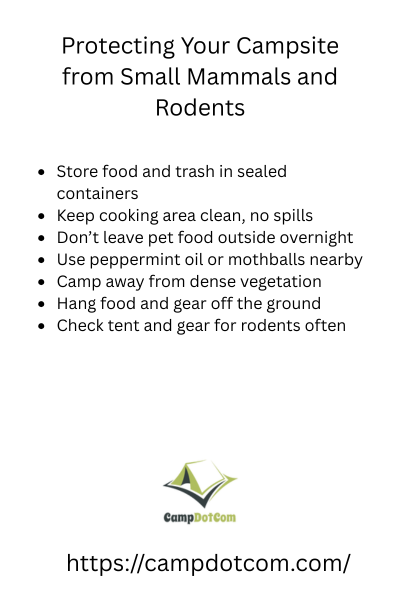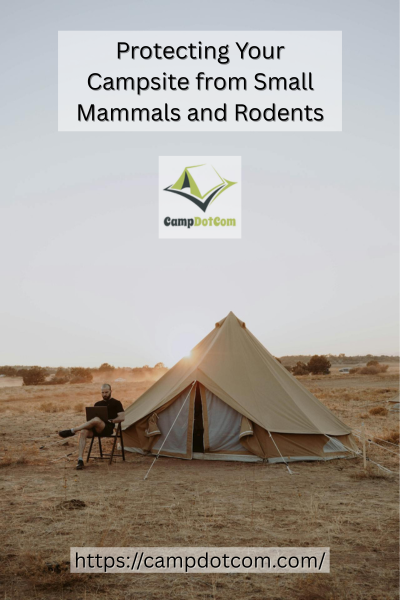Protecting your campsite from small mammals and rodents isn’t just about keeping your snacks safe—though let’s be honest, that’s a big part of it. It’s also about staying healthy, keeping your gear intact, and avoiding those oh no moments when a critter decides your tent is the perfect chew toy.
I’ve had my fair share of run-ins with curious raccoons, overly confident squirrels, and one particularly bold mouse who thought he owned my trail mix. So yeah, I’ve learned a thing or two about how to keep your site animal-free without ruining the whole outdoor vibe.
Read More About Protecting Your Campsite from Small Mammals and Rodents

The Sneaky Little Guests You Didn’t Invite
You are out in the great outdoors, breathing in the fresh air and admiring the stars, when suddenly you hear a soft rustling sound. That is your first clue. Small mammals and rodents such as mice, chipmunks, raccoons, and even the occasional opossum are always on the hunt for an easy snack. And a campsite can feel like an all you can eat buffet if you are not careful.
As an Amazon Associate, I earn from qualifying purchases. Some of the links in this article are affiliate links. This means that, at zero cost to you, I will earn an affiliate commission if you click through the link and finalize a purchase.
These little visitors are quick, sneaky, and smarter than you might think. Leave a bag of marshmallows out just once, and somehow the news spreads. Before you know it, tiny paws are rummaging through your food bag in the middle of the night.
More Things to Know About Protecting Your Campsite from Small Mammals and Rodents

So, Why Bother Protecting Your Campsite from Small Mammals and Rodents?
It might seem like just a small inconvenience, but it can quickly grow into a real problem. Rodents chew on anything they find such as wires, sleeping pads, backpacks, you name it. Nothing is safe. There are also health risks to consider, as some of these animals can carry diseases. You definitely do not want their droppings or saliva anywhere near your things, especially your food.
I remember waking up one morning to find a hole chewed right through my backpack. My granola bars were gone, and there were tiny teeth marks on my phone charger. Cute? Maybe. Costly? Absolutely.
Food Storage Is Everything
Let’s talk about strategy. If you’re serious about protecting your campsite from small mammals and rodents, the number one rule is store your food properly.
Coolers don’t cut it unless they’re locked. A raccoon can open a simple latch like it’s solving a puzzle on a kids’ game show. If you’re camping in an area with bear lockers, use them—even if you’re not expecting bears. They work great for keeping out smaller critters too.
No bear locker? Use a hard-sided, sealed container, or hang your food in a sturdy dry bag at least 10 feet off the ground and four feet away from the tree trunk. Make it look like a challenge, and most rodents will give up.
Keep It Clean (Your Campsite, That Is)
Crumbs, wrappers, and dirty dishes—these are neon signs for rodents saying “free food here!” You’ve got to be one step ahead. Clean as you go. Wipe down surfaces, store trash in sealed bags, and never leave food unattended.
Oh, and don’t forget about your car if you’re car camping. A mouse will squeeze into the tiniest space if it smells something delicious. You really don’t want to find one staring at you from your dashboard.
Don’t Feed Them, Even Accidentally
I know, chipmunks are irresistibly cute. But giving them food is like opening a door you cannot close. They will return. With friends. And cousins. And maybe even some distant relatives. They will not just wait for handouts either — they will help themselves the moment your back is turned.
One time, I made the mistake of tossing a few peanuts to a chipmunk during lunch. It was sweet until he climbed right into my lap and tried to take the whole bag. The next day, two more chipmunks were waiting for their morning meal. I had apparently started a little woodland gossip chain.
Pick the Right Campsite
It’s not just how you camp, but where. Some spots are known rodent hotspots—like areas near water or popular camping zones where people get lazy with food. Look around. If you see burrows, droppings, or chewed bits of trash, move on. No need to set up camp in someone else’s pantry.
Also, avoid camping right next to thick underbrush. That’s prime hiding real estate for rodents, and they’ll be in your gear faster than you can say “Where’s my trail mix?”
Keep Your Campsite Safe from Rodents and Enjoy the Outdoors
Here’s the thing: keeping small mammals and rodents away from your campsite is not about being overly worried or spoiling the fun. It is about being smart, ready, and showing respect for nature. You are there to enjoy the outdoors, not to spend the night defending yourself from a team of squirrels.
You do not have to build a fortress. The goal is simply to make your campsite less tempting than the one nearby. Most rodents are opportunistic. If getting to your food looks like too much trouble, they will look elsewhere.
So, the next time you head into the woods, bring sturdy food containers, hang your snacks up high, tidy up as if your campsite depends on it (because it truly does), and with a bit of luck, you will make it through the night without hearing tiny squeaks inside your tent.
And believe me, nothing spoils a peaceful sunrise coffee more than discovering a mouse ran off with your creamer packets.
